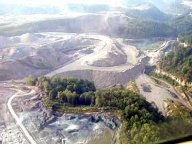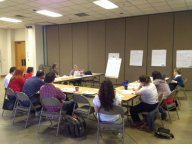Appalachia’s Bright Future conference got off to a hopeful and challenging start Friday night as participants explored lessons learned from efforts by communities in Wales to “regenerate” after a dramatic loss of coal mining jobs.
Though coal mining is still a part of Wales’ economy, much changed when tens of thousands of jobs were lost over a span of a few years in the 1980s, said Hywel and Mair Francis.
Recovery did not come quickly or easily – and is still very much in process – they explained. But it is happening because people in the region took the initiative, relied on the assets they had in local communities and found partners outside their valleys to support new projects.
 “We always felt our dreams should become a reality,” said Mair Francis, a founder of Dove Workshop, a community development program in Wales. But, she added, “it was something we had to fight for ourselves.”
“We always felt our dreams should become a reality,” said Mair Francis, a founder of Dove Workshop, a community development program in Wales. But, she added, “it was something we had to fight for ourselves.”
She described Dove as a “a bottoms-up organization – we respond to the needs of the community.” Success has come because what they’re “doing relates to what the people want in the community – good child care, good transport, good jobs.” She also noted that "what made the local struggles so different was the role of women. They did not simply support; they led."
A variety of projects have helped diversify local economies, explained Hywel, ranging from mountain biking trails to a wind farm to reclamation of toxic slag piles left by the mining and other projects to draw wealth to their region.
The history of Welsh coal mining communities is well-documented by Appalachian scholars Dr. Helen Lewis and Pat Beaver and filmmaker Tom Hansell, who also were on the opening night panel. In 1975, Lewis and others started visiting Wales. And in 1979, with Beaver's involvement, they began an exchange of Welsh and Appalachian coal miners.
Lewis said she was drawn by a similar history of industrialization based on the extraction of minerals, and experience of colonialism. She wondered, concerning both Wales and Appalachia, “How could an area that created the greatest wealth be the poorest part of the state?”
The panel’s presentation After Coal: Wales and Appalachian Mining Communities helped participants be challenged by the question, as stated by Hansell: “How do you create an economy that works for the majority of people” where there will no longer be a single major employer, a single major driver of the economy?
 In her opening comments, conference co-emcee Elizabeth Sanders of Letcher County gave some guidance and set the tone for the rest of the weekend. “We know we have to work together to build it. And we all have something to bring to the table,” she said. “We come up with what’s going to work by bringing these ideas together … and creating a shared vision. That’s why I’m excited about this weekend.”
In her opening comments, conference co-emcee Elizabeth Sanders of Letcher County gave some guidance and set the tone for the rest of the weekend. “We know we have to work together to build it. And we all have something to bring to the table,” she said. “We come up with what’s going to work by bringing these ideas together … and creating a shared vision. That’s why I’m excited about this weekend.”
Appalachia's Bright Future continues on Saturday and Sunday at the Harlan Center.








